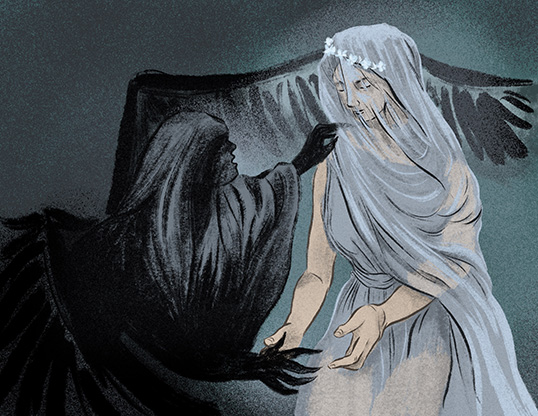APOLLON:
Admetos’ house. Taste of slaves’ bread.
I endured it—
Zeus was the catalyst. He killed my son,
my golden boy, Asklepios,
struck a flare of lightning at his heart.
Rage seized me.
I slew the Kyklopes who forged
our Father’s bolts of fire;
he forced me down to earth
as a mortal’s servant. I found my way here,
tended the livestock, protected the house.
My nature is holy; Admetos shares it.
And his reward? Salvation
from death. I tricked the Fates,
got a promise that he could stay alive
by giving the underworld gods
a substitute corpse. But—
nothing. He asked them all,
down to his noble progenitors.
No one would renounce the sunlight for him,
except her: Alkestis.
And now she’s dying in his arms,
for this is the evil day. I must leave
the house that I loved,
or death’s miasma will touch me.
(Enter DEATH.)
There! Already he comes,
the sacrificer of the dead.
He has lain in wait for her.
DEATH:
Aha, Phoibos! Don’t tell me why you’re here.
Let me guess.
You have more injustice to commit
against the gods below,
to deprive us of our honors.
Wasn’t it enough for you to beat the system
by preventing Admetos’ death?
Are you on patrol with your weapons,
guarding Pelias’ daughter,
who promised to die instead of her husband?
APOLLON:
Don’t worry. All I have is justice
and straight talk.
DEATH:
Then why the bow and arrows?
APOLLON:
Force of habit. I always carry them.
DEATH:
Your other habit
is giving this house unfair advantages.
APOLLON:
It grieves me to see my friend in trouble.
DEATH:
Are you planning to steal another corpse?
APOLLON:
I didn’t take even one by force.
DEATH:
How is he here, not six feet under?
APOLLON:
You know. He’s trading her,
the one you’ve come for.
DEATH:
Yes. I’ll take her down below.
APOLLON:
Take her, then. I don’t imagine
that I could persuade you.
DEATH:
To kill the one scheduled
for death? That’s my job description.
APOLLON:
No, to postpone it for the slated victim.
DEATH:
I see what you mean. I know what you want.
APOLLON:
Is there any way Alkestis
can see old age?
DEATH:
None.
I have my rights.
APOLLON:
No matter what, you’ll get only one life.
DEATH:
I take home greater honors
when my prey is young.
APOLLON:
If Alkestis dies old,
they’ll bury her with treasure.
DEATH:
Your precedent, Phoibos,
is biased toward the rich.
APOLLON:
How? I don’t understand.
Your argument must be too subtle for me.
DEATH:
The wealthy could pay for death to wait
until they were ready.
APOLLON:
I assume you’re not inclined to cooperate.
DEATH:
Not a chance. You know what I’m like.
APOLLON:
Yes. Mortals hate you, gods hate you more.
DEATH:
Face it—
you can’t have what you’re not supposed to.
APOLLON:
I swear, no matter how savage you are,
you’re going to lose. The man
to stop you is coming to Pheres’ house.
Eurystheus sent him off to Thraike,
that wintry land, to bring back
Diomedes’ blood-frenzied mares.
As Admetos’ guest,
he’ll wrest the woman away from you.
You’ll do what I wanted, and in return
you’ll have no gratitude from me,
only my continued hatred.
(Exit APOLLON.)
DEATH:
Your brave talk won’t achieve anything.
In any case, the woman takes a one-way trip
to the house of Haides. I’m going now
to shear off the first lock of her hair;
for the one whose head my sword hallows
is marked for sacrifice to the gods below.
(Exit DEATH.)
(Enter CHORUS.)
CHORUS:
Why this stillness outside the palace
Why the shroud of silence on Admetos’ house
None of his dear ones are here to tell us
Is the queen dead
Should we mourn
Does Pelias’ daughter still live in the light
Alkestis, the noblest of wives to her husband
So say I and so we all say
—Wait
Does anyone hear a moan, a wail
Percussion of hands beating breasts
As if the story had ended
—No, and no one is there
Not even a gatekeeper
O Paian, may you come in brightness
In the wrack of our grief
—If she were gone they would not keep silent
The body is not yet taken away
—How do you say so
I am in doubt
What gives you certainty
—How could Admetos bury his wife
The woman he loved
With no one to mourn her
—I do not see before the gates
The lustral basin
That custom demands
Be placed at death’s doors
—No tress of hair cut
To lie at the doorway
As is fitting for death
No heavy hands striking
The women’s breasts
—Yet this is the day ordained—
—What is this you are saying
—When she must descend underground
—You have touched my soul
You have touched my heart
—When the noble are helpless
In suffering
It is right for the ones
They hold true to mourn
—But in all the earth
There is no shrine
Where you might voyage
Not Lykia, not the desert
Temple of Ammon
To deliver the life
Of the ill-starred queen
And I, where shall I go
To what god’s altar
—Only Phoibos’ son
If his eyes still saw daylight
Could let her leave
The nighttime realm
For he raised up
Those overcome by death
Until the spike of fire
From Zeus’ thunder killed him
And now what hope shall I take
For her life
—All rites have been finished
By the king’s household
Blood runs from the altars
Of all the gods
Yet there is no cure for this pain
(Enter an ATTENDANT.)
But an attendant comes from the house,
in tears. What turn of fortune
will I hear from her?
No one will blame you for mourning
if something has befallen
your lord and lady; but let us know
if the queen still breathes
or if she is no more.

